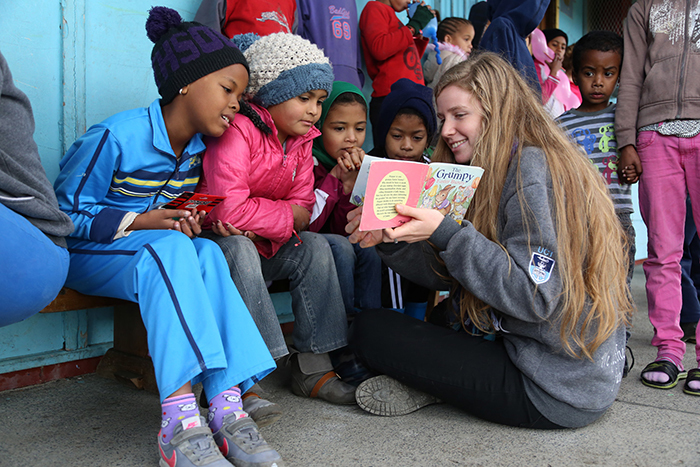Student leaders at the heart of the socially responsive campus
01 July 2015 | Story by Newsroom
How can universities harness the power of student leadership without it being tantamount to "putting a pin on a butterfly"?
This was among the questions raised at a recent seminar on the topic of student leadership, led by Dr Nick Longo, a visiting scholar at the Centre for Higher Education Development's Centre for Innovation in Learning and Teaching.
Longo, an associate professor of Public and Community Service Studies at Providence College in the United States and scholar with the Charles F Kettering Foundation, has a special interest in youth civic engagement and community based leadership.
Said Longo at the start of his seminar: "My one simple argument is that we need to put student leadership at the centre of a socially responsive campus ... If we do that, that's the greatest possibility for transformation."
Alluding to the fact that the Rhodes Must Fall campaign recently occupied the Mafeje Room in Bremner, where the seminar was taking place, Longo encouraged participants to think more broadly around student leadership and how to harness its full potential.
Citizen politics transforms
Talking about his own background as a college student, he said he had come from a politically aware family and had initially experienced disillusionment with politics and politicians when he arrived on campus in the United States.
This had changed when he enrolled in service learning programmes and realised that politics wasn't just about "big P" politics but also about citizen politics, which had the power to transform communities and societies.
He said there was more common ground than generally thought between students who were involved in service organisations, like UCT's student organisation SHAWCO, and those who were political campaigners.
"Part of our work as educators is to make those connections, to help the students who are doing direct service to see the political dimensions of their work, and to help the students who are doing organising work to think about relationship-based organising that is also the basis of service work on campus."
Civic agency and new leadership
Longo said there were three deficits in democracy today, which had a bearing on this debate.
First, there was a loss of trust and confidence in government and other major institutions.
Second, there was a civic empowerment gap, which meant that the people most able to provide solutions were disconnected from decision-making processes.
Third, major challenges – such as massive inequality and HIV/AIDS – could not simply be solved with technical expertise.
All these were coupled with a leadership deficit. In his view, higher education had an essential role to play in bringing about change and campuses needed to be a staging ground for action.
He cited Ernest Boyer's view that "the scholarship of engagement means connecting the rich resources of the university to our most pressing social, civic, and ethical problems".
Among the changes in perception required was to see students, not as consumers of education, but as producers of knowledge. Also, there needed to be a leadership shift away from "top-down structures" to the notion that "we are all leaders", able to work together and collaborate to solve problems.
In this respect, universities had huge untapped resources and there were many practical ways to take the transformation agenda to the next level, he said.
Longo suggested these could include drawing scholarship students into structured roles, having students and student tutors act as thought leaders and generating public scholarship in engaged thesis and entrepreneurship projects.
He said leadership potential was often one of the criteria for scholarships and yet recipients were often not asked to do anything structured within the institution. This was a bit like offering a football bursary to a promising player without asking them to be on the university team.
Bridging the divide
The discussion that ensued focused on how students were a source of creative energy and ideas, with some 5 000 on campus actively involved in societies of one sort or another, even though there were perceptions of student apathy.
It was also noted that the Rhodes Must Fall campaign had stimulated debate on both sides of the divide, but there was concern around how this engagement had happened and the atmosphere that it had generated on campus. Another issue raised from the floor was how to bridge the divide between traditional politics and social engagement.
"If the political situation is left to the rogues and civic stuff to the saints, what are we saying? Why are we not able to get civic leaders into politics?" asked a participant.
Longo concluded the seminar by quoting American poet Maya Angelo's words: "In the worst of times, in the meanest of times, in the most threatening of times, the viewer can see light, a ray of hope ... once you leave the university and are prepared for the world, you will see."
Story by Andrea Weiss. Photo by Je'nine May.
 This work is licensed under a Creative Commons Attribution-NoDerivatives 4.0 International License.
This work is licensed under a Creative Commons Attribution-NoDerivatives 4.0 International License.
Please view the republishing articles page for more information.










